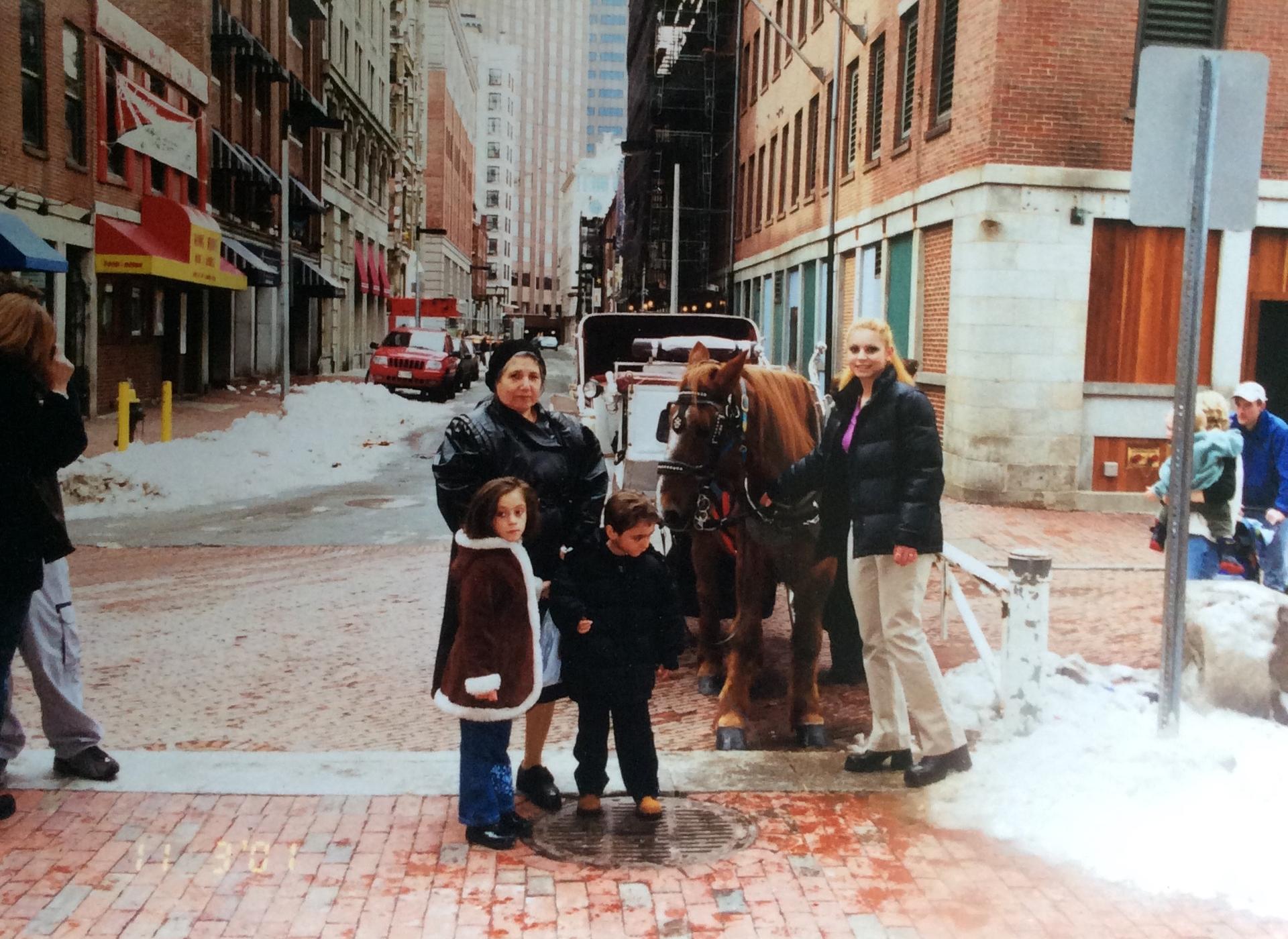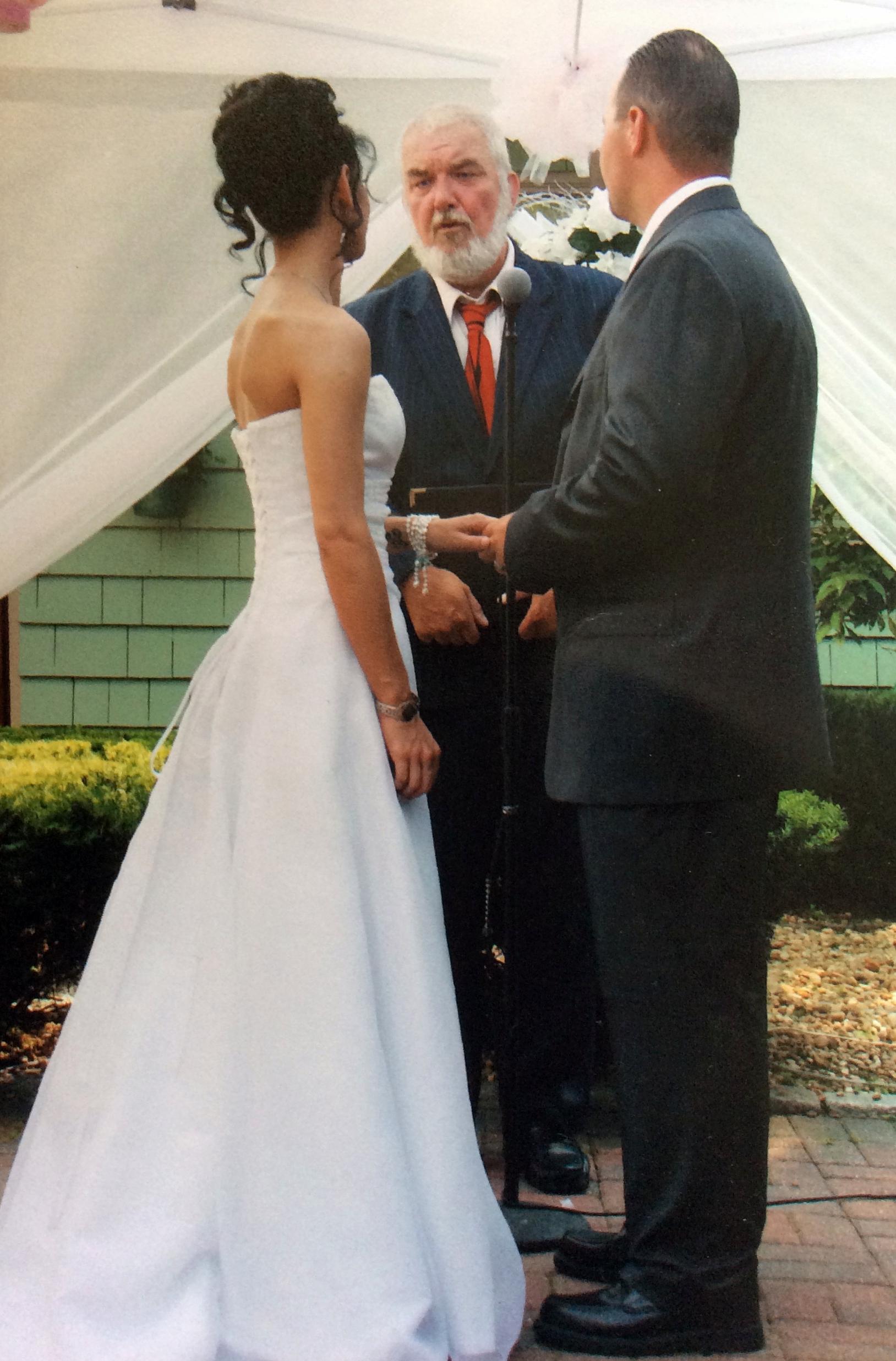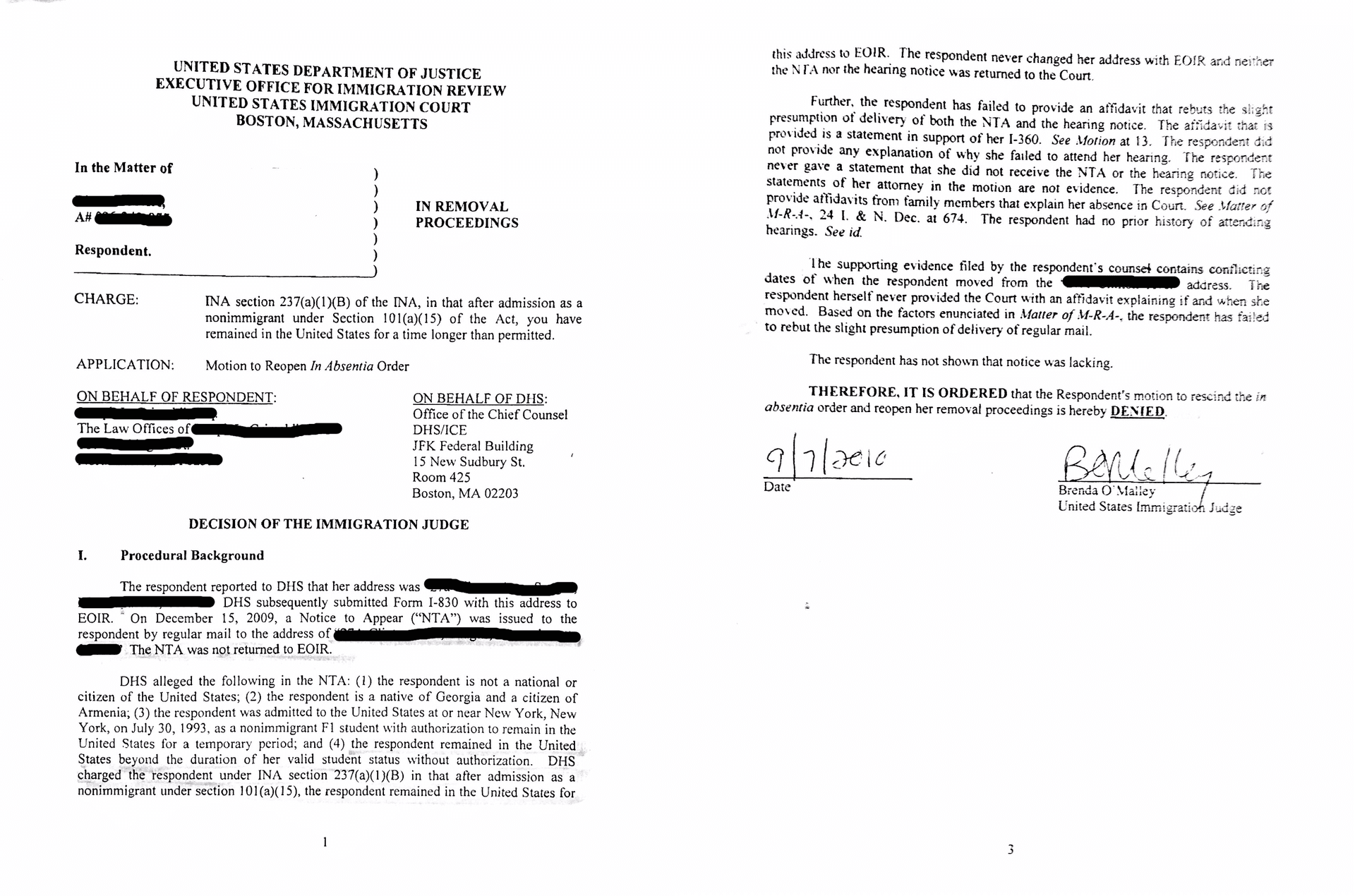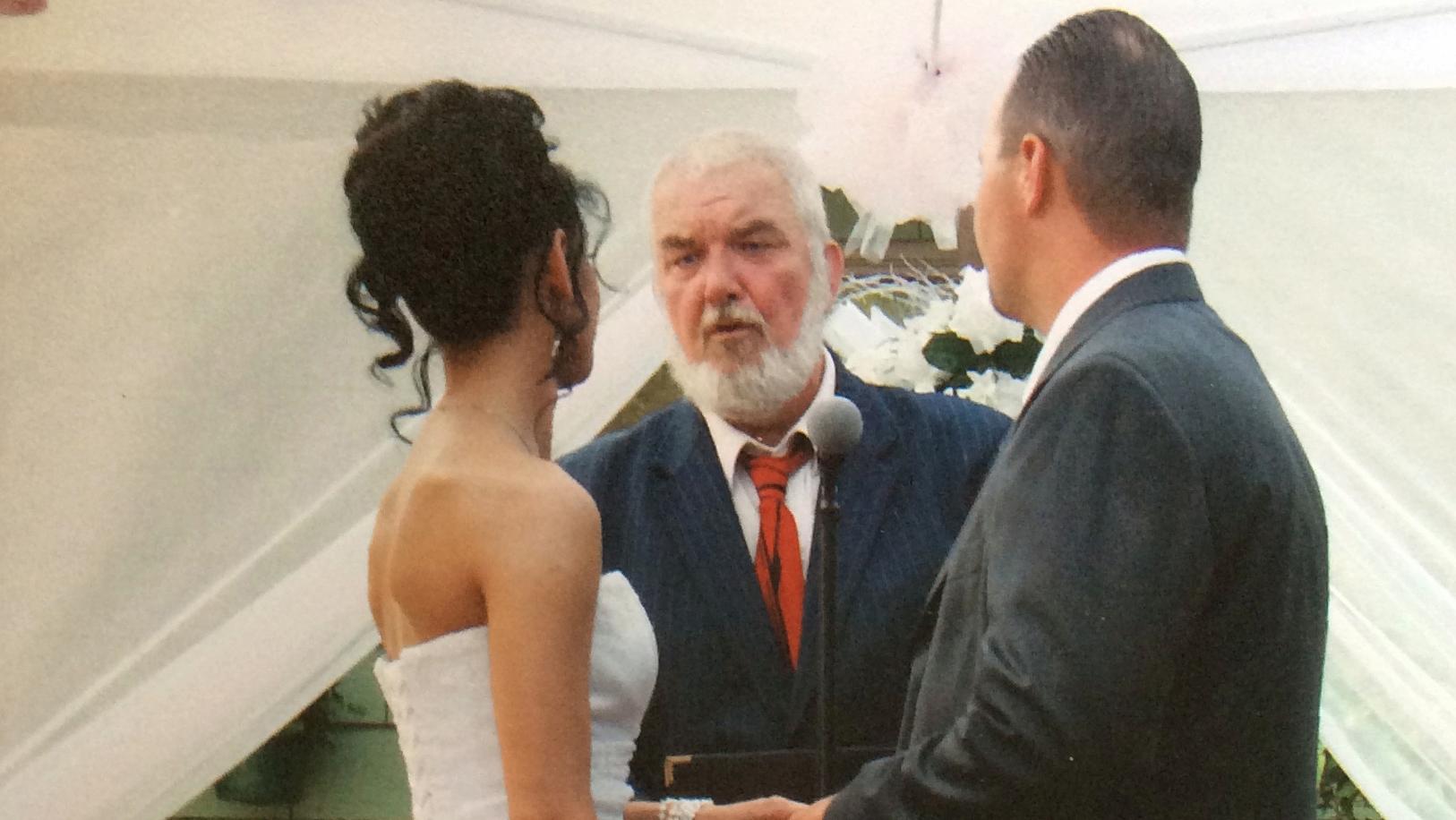This is how an entire family that grows up together in the United States can end up with one person undocumented
Lucy Martirosyan’s sister (left) neither entered the country illegally nor did she overstay a visa. The US government thinks otherwise, though. She came to be undocumented because her marriage to a US citizen failed.
About 11 million undocumented immigrants live in the United States.
My older sister is one of them.
The Department of Homeland Security says she overstayed a student visa. If that were true she wouldn’t be alone. Some researchers estimate that as many as half of all undocumented immigrants are people who came to the US legally, but then stayed after their visas expired — that’s what Michelle Mittelstadt of the Migration Policy Institute (MPI) tells me. But she says it’s a difficult number to pin down.
But my sister neither entered the country illegally nor did she overstay a visa, despite what the government says. Deana — she asked me to refer to her by a pseudonym to tell her story — fell through the many cracks in our immigration system. She came to be undocumented because her marriage to a US citizen failed.
Deana came to the US with our mother on July 30, 1993, her ninth birthday. They left Yerevan, Armenia, to move to Connecticut while our father was studying. They had visas as the family members of international students.
After a few years, my parents and sister gained work visas and moved to Massachussetts. My father got a job with an employer that sponsored him for an H-1B visa. My twin brother and I were born soon after, in 1996 — US citizens by virtue of our birthplace.
We grew up together outside of Boston; Deana went to a private school in Winchendon and graduated from Watertown High School. By the time she was a teenager, she fit in with everyone else. She played varsity lacrosse and earned straight As on her report card — besides one C in gym class.
“I hated thinking of myself as an immigrant,” Deana says.
We’re sitting at our dining table while she eats French toast for breakfast and simultaneously watches over her toddler, my niece. It’s the first time we’re talking about her story in one sitting.
“I remember, especially in Watertown, where there’s that huge Armenian community,” she tells me. She remembers one of her friends. "She was an immigrant, but she had her green card. She didn’t identify herself as an immigrant. She was American. And so, that’s how I always identified myself too. Everything’s right, I’m legitimately here.”
College was different, though. Deana missed an entire semester of classes at the University of Massachusetts, Amherst, because she wasn’t eligible for in-state tuition or financial aid. Our family couldn’t afford the cost.
“That’s when I started feeling like an immigrant,” she says. “They didn’t know how I should do the whole admissions process. Because they said, ‘Well, your English is good so you don’t need to take the TOEFL.’ But, at the same time, I couldn’t apply as an international student because I lived here.”
“But then when I met [her future husband], I didn’t feel that. I just kind of shed that skin,” she recalls.

A love story
Deana was 19 when she met her husband in 2003. He was 25. I was seven years old when I first met him. He was tall, quiet and baby-faced; he came from a big Italian American family. He introduced me to Star Wars when I visited their apartment years later.
They both dropped out of college their sophomore year. He had just gotten out of rehab for the second time and Deana decided to leave school and take care of him.
“I couldn’t be at school and drive back every single weekend to take care of him because he was sick,” Deana says. They dated for six years before getting married.
By then, our parents had lived in the US on work visas long enough to apply for green cards. They had submitted their applications to adjust their status in 2000. Then, Deana and our parents passed their green card interviews. And for roughly eight years, USCIS conducted a namecheck, an investigation that consists of criminal backgrounds and security checks, on both Deana and our parents.
In 2008, Deana married. She changed her last name and sent her marriage certificate along with the final documents USCIS had requested, thinking this would speed up the process.
A few months later, our parents received their green cards. Deana's application was denied.

“Everyone thought, ‘Oh, if you get married and you marry a US citizen this is going to go so much faster for you. And if you even just show it and prove it to them, how can they deny it?’ That was the mindset,” Deana says. “So that’s what I did. Apparently I did the wrong thing because I didn’t research anything. I didn’t know anything about immigration.”
Almost a year later, it was time for her second green card interview. That’s the same summer when Deana’s marriage fell apart.
He didn’t show up to the Interview.
“I waited, I kept calling him and I kept calling his parents. Nobody was answering. He was just nowhere to be found. He didn’t show up. I told the officer, ‘I think my husband is getting held up at work.’ And he said, ‘That’s OK, this type of thing happens. We will send you a notice in two weeks.’ So I’m waiting for the notice, I’m thinking, ‘OK, we’ll do a do-over.’”
Weeks went by.
“There’s no notice. I just get a deportation letter,” she remembers.

Deana and her husband were separated. She returned to our family’s home in Belmont and updated her address with USCIS. Nevertheless, on December 15, 2009, a “Notice to Appear” for a deportation hearing was sent to her old apartment. Her husband never forwarded any mail to Deana and she missed the hearing.
Months later, Deana received a deportation letter at our home address. She keeps it stored away in a box with hundreds of other immigration documents underneath her daughter’s bed. It reads:
“The respondent remained in the United States beyond the duration of her valid student status without authorization.”
Basically, DHS’ immigration office claims that Deana entered the US under her own student visa and later over stayed it.
But there’s no mention of the fact that she was a “beneficiary” of our father’s student visa and later work visa. There’s also no mention of her marriage to a US citizen either. DHS packed her away into a neat, outdated statistic: a visa overstay.
Deana was 26 and I was 14 when she received that deportation letter. We shared a room in the attic of our condominium at the time.
I didn’t know anything about immigration then. All I knew was that my sister received a deportation letter and that could mean that we would be separated for a long time, thousands of miles away from each other.
Deana talked to six different attorneys, and many more immigration advocacy groups. One attorney refused to help her because he found her case overwhelming. Another one claimed he could solve her case within two years, but he was too expensive to hire.
She settled for an affordable attorney who eventually halted the deportation proceedings in 2012 and successfully filed an I-360 petition, for widowed or battered spouses.
Her relationship was unhealthy and co-dependent — and it spiraled out of control, Deana says.
But the deportation letter, along with her husband's failure to attend the green card interview, seems to have led immigration courts to believe that she married in ill-faith. That she had a “green card marriage.”
More often than not, Deana says, her attorney failed to disclose information to her — she missed deadlines, didn’t know about fees and what to send to USCIS, like wedding photo albums to prove that her marriage was real. She says she had better luck researching this information on her own than waiting for her attorney to tell her about all these details.
No gray zone
Six years, mishandled deadlines and two appeals later, her status remains ambiguous.
Without a definitive status, she’s labeled as an undocumented immigrant. She’s barred from driving, working or even freely leaving the country to visit our extended family throughout the Caucuses and Europe. She hasn’t seen my grandmother and relatives in Lithuania and Armenia in more than two decades.
“Essentially, there’s legal status and there’s unauthorized status. There’s no gray area in between,” says Mittelstadt of MPI.
In total, more than 2.5 million undocumented immigrants have been deported during the Obama administration. That’s 23 percent more removals than there were during the George W. Bush years.
More: Is Obama really the 'Deporter-in-Chief?' Depends on whom you ask
Our parents became US citizens in 2013.
In 2014, Deana applied for the original 2012 Deferred Action for Childhood Arrivals (DACA), which would grant her temporary relief from deportation and work authorization.
About 2 million people who came to the US as children meet the requirements for this deferred action, according to MPI. Deana has yet to receive any response from USCIS on DACA or any of her other immigration requests.
On November 22, 2014, Deana’s daughter was born. But she was born two days late. Obama’s announced an executive action to give temporary relief to the undocumented parents of children born in the US before November 20, 2014. Deana was disqualified for Deferred Action for Parental Arrivals (DAPA), though that program is now tied up in legal battles, anyway.
“We need immigration reform.” says Deana. “There’s no line. There’s just age. I have a daughter, she’s 2. There’s no such thing as an ‘anchor baby.’ It does not exist.”
As she tells me this, she’s holding my niece on her lap while she finishes up her meal. I’ve had friends ask me how my sister “lost her US citizenship” in the first place — and why can’t she get it back? Deana hears the "anchor baby" myth a lot from people she first meets.
“For those people who think there is, that’s crap. There is a thing where if she turns 21, she can bring me back into the country and I can apply for a green card and subsequently for US citizenship. But that’s when she turns 21. What do we do then? What do we do for those 21 years?”
No good choices
Deana has since applied once more for citizenship via my parents, as an “alien relative.”
She is over the age of 21, so she’s no longer considered immediate family to our parents. If her application were to be accepted, she would need to first leave the country to her “homeland.” While her application was processed, she would have to go to either Armenia; where her expired passport is from, or to Georgia, as she was born in the former Soviet Republic of Georgia. If her application were denied by USCIS, though, she would be barred from returning to the US for years.
Middlestadt explained this to me: It’s part of a 1996 law, passed during the Bill Clinton administration, that bars people who have lived in the US while undocumented from re-entering the country for three or 10 years. In my sister’s case, because she was in the US for more than one year, she wouldn't be allowed to return for 10 years.
“So the fact is that you have this population in the US that is essentially not able to avail itself, or only small numbers are able to avail themselves, of their eligibility for a green card because they don’t want to trigger these bars for reentry,” Mittelstadt says.
And the number of people in this situation is “not insignificant,” she says.
The result is this: If Deana just “went back,” I could be separated from my sister (my best friend) and my niece for an indefinite period of time. She would be waiting for a visa in a country she doesn’t know. Only then could she possibly be welcomed back into the US, with eligibility for a green card and then US citizenship.
More: This is what it actually takes to be a 'legal immigrant' in the US
Bill Clinton’s 1996 law is called the Illegal Immigration and Immigrant Responsibility Act. He also signed the Antiterrorism and Effective Death Penalty Act, which expanded the grounds for deporting undocumented immigrants and gave judges less discretionary power to make decisions in gray areas.
It’s these laws that Hillary Clinton has declared she would change in her first 100 days as president. She has also said she would protect and expand deferral programs like DACA. Trump’s platform is to expand deportations and build a wall. More recently, he’s proposed “a really fair but firm” approach to immigration. That is, to keep undocumented immigrants in the US so long as they pay taxes. He's due to make a major immigration speech Wednesday afternoon.
This July marked Deana’s 23rd year living in the US and her 32nd birthday. She spends the majority of her time working as a full-time single mom and going to childcare and parenting classes with her daughter, who is almost two.
“Immigration is a mess. New laws need to be implemented,” Deana says. “What about the children who had no choice? Who did grow up in this country, some legally, some illegally — what do you do with them? What country do you say they belong to? With my experience, this is my country. This is my home.”
